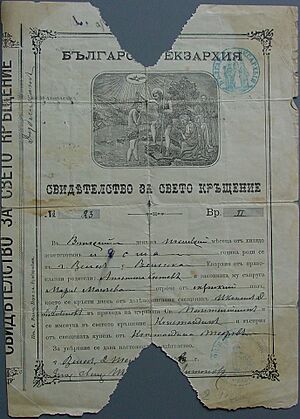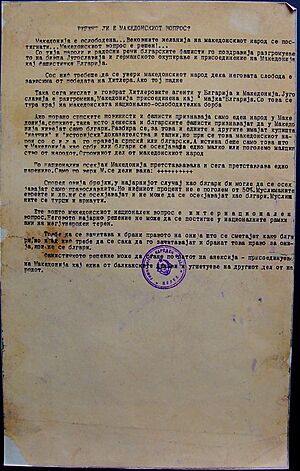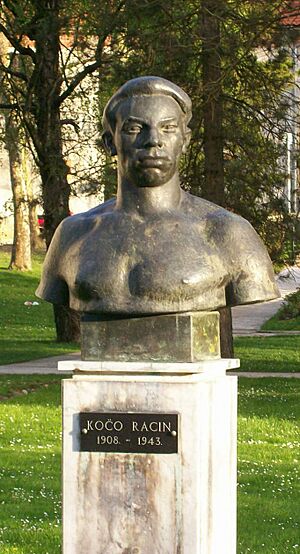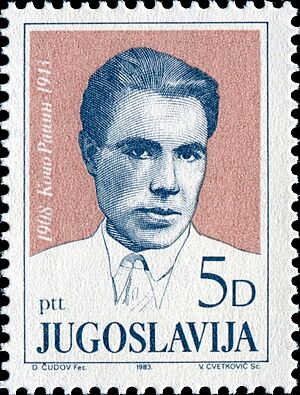Kočo Racin facts for kids
Quick facts for kids
Kočo Racin
|
|
|---|---|
| Кочо Рацин | |
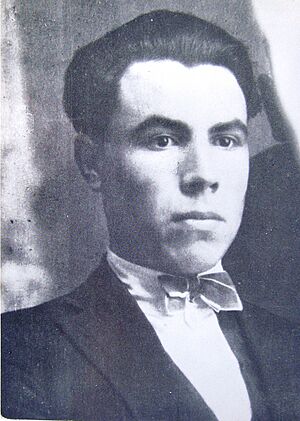 |
|
| Born |
Kosta Apostolov Solev
21 December 1908 Veles, Ottoman Empire
|
| Died | 13 June 1943 (aged 34) Lopušnik, Albanian Kingdom
|
| Occupation | Writer |
| Known for | Foundation of the modern Macedonian literature |
|
Notable work
|
White Dawns |
Kočo Racin, whose real name was Kosta Apostolov Solev (born December 22, 1908 – died June 13, 1943), was a famous writer and poet from North Macedonia. He is known as one of the most important people who helped create modern Macedonian literature and poetry. Racin also wrote stories and articles about history, ideas, and books. He wrote in Serbian and Bulgarian too.
Contents
Discover Kočo Racin's Life
Early Years and Family Life
Kočo Racin was born in 1908 in a town called Veles. At that time, Veles was part of the Ottoman Empire. His family was very poor. His father, Apostol, worked as a potter, making clay pots. He earned just enough money to feed his family. Because of this, Racin could not stay in school for very long. He only finished one year of high school when he was thirteen. After that, he started working in his father's pottery workshop to help his family.
Joining the Communist Movement
In 1924, when he was 16, Racin joined a political group called the Communist Party of Yugoslavia (KPJ). He quickly became one of the most promising young members in Macedonia. By 1926, he was part of the local KPJ committee in Veles. During this time, he wrote for a newspaper called Organizovan radnik (Organized Worker).
In 1928, Racin went to a big meeting for the KPJ in Dresden, Germany. He was the only person from Macedonia there. When he came back to Yugoslavia, he was arrested but was let go three months later. In 1929, he joined the army.
Later, in 1933, the Communist Party in Macedonia started up again. Racin helped create a new local committee. He also became the editor of a new monthly newspaper called "Iskra" (Spark). He used the name Konstantin Solevic to keep his identity a secret. In 1934, Racin and 14 other leading communists were arrested. Racin was sent to prison for four years. However, he was released early in 1935. While in prison, he met other important communists. They encouraged him to write in his native Macedonian language. He even helped translate an important book called the "Communist manifesto" into Macedonian.
Racin's nickname, "Racin," came from the name of a girl he loved, Rahilka Firfova-Raca.
White Dawns and Party Challenges
After leaving prison, Racin started writing many poems and songs. In 1939, he published his most famous collection of poems, called White Dawns (Macedonian: Бели мугри). He also wrote articles and works about history, philosophy, and literature.
Around 1940, Racin faced difficulties with the Communist Party. He was removed from the party, possibly because he criticized their work or refused to take a stand against another writer. Party members were told to avoid him. This situation lasted until 1942, when his relationship with the party improved. After Yugoslavia was defeated in World War II, Racin worked in Sofia, Bulgaria, for a while. He lived with another Macedonian writer, Kole Nedelkovski. After Nedelkovski's death, Racin returned to Skopje. There, the Bulgarian police arrested him and sent him to live in a village called Kornitsa.
Joining the Partisans and Tragic End
In 1943, Racin managed to get back to Skopje. In the spring, he joined the Yugoslav Partisans, who were fighting against the occupation. He became an editor for their newspaper, Ilindenski Pat. He also prepared two collections of Macedonian folk songs.
Kočo Racin's life ended sadly on June 13, 1943. He was shot while returning from a Partisan printing house on Lopušnik mountain. There are two main ideas about how he died. One idea is that it was an accident. Racin had trouble hearing, so he might not have heard the guard's warning to stop. The other idea is that he was murdered. Some people believe he was politically isolated and that his death was planned.
Kočo Racin's Creative Works
From 1928 onwards, Kočo Racin wrote many different things. He wrote songs, stories, articles about literature and history, and essays. He believed that modern Macedonian literature should use the rich traditions of Macedonian folk stories and songs. He also thought it should include ideas about making society better. His most famous work is the poetry collection White Dawns (Beli mugri), published in 1939. Racin often wrote about the struggles of poor farmers and workers.
Poetry
Racin started writing poetry in 1928. He wrote love poems for Rahilka Firfova, which are now kept in the Archive of North Macedonia. Most of these early poems were in Serbian, with a few in Bulgarian.
His first published poem, "Hungry Sons," appeared in a magazine in Zagreb, Croatia. In 1932, he published a collection of poems in Serbian with two other students. This collection included "Firework," one of his most powerful poems.
His first poem written in Macedonian was "To a Worker," published in 1936. In 1938, he published "The Death of the Asturian Miner," honoring a miner from Veles who died in the Spanish Civil War.
His biggest success was White Dawns in 1939. This book sold 4,000 copies and was popular across Yugoslavia. In 1943, a collection called Macedonian People's Liberation Songs was published, but Racin was the editor, not the author.
Prose (Stories)
Racin's first story, Result, was published in 1928. In 1932, he won an award for his story "In the Quarry." He also wrote several novels, including The Tobacco Pickers (1937), Noon (1937), One Life (1937), and Golden Craft (1939). Two other novels, Father (1939) and Happiness Is Big, were published after his death.
Historical Writings
Racin was very interested in a historical religious movement called Bogomilism. He wrote three works about it. Only one, The Country Movement of the Bogomils in the Medieval Period, was published during his lifetime in 1939. His work The Bogomils was written in Macedonian. Racin was the first Macedonian writer to study this movement.
Philosophical Ideas
Racin was especially interested in the ideas of a philosopher named Georg Wilhelm Friedrich Hegel. He wrote articles about Hegel, including "Hegel" and "The meaning of Hegel's philosophy," both published in 1939.
He also became interested in ideas about women's rights, which he saw as a fight for basic human rights.
Kočo Racin's Lasting Legacy
Kočo Racin's work continues to be important today. In 1952, a film poem called "White Dawns" was made using his poetry. In 1956, his childhood home in Veles was turned into a museum.
Since 1964, an annual poetry festival called "Racin's meetings" has been held in his hometown of Veles to honor him. Since 1992, this event has included participants from all over the Balkans. In 2007, a movie called Elegy for you was released, telling his story.
Some authors from Bulgaria believe that Racin had pro-Bulgarian views. They also suggest that his death might have been planned because some Yugoslav Partisans thought he was too pro-Bulgarian.
See also
- List of Macedonians (ethnic group)
 | Janet Taylor Pickett |
 | Synthia Saint James |
 | Howardena Pindell |
 | Faith Ringgold |


